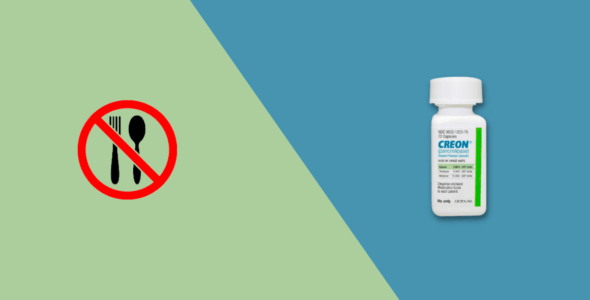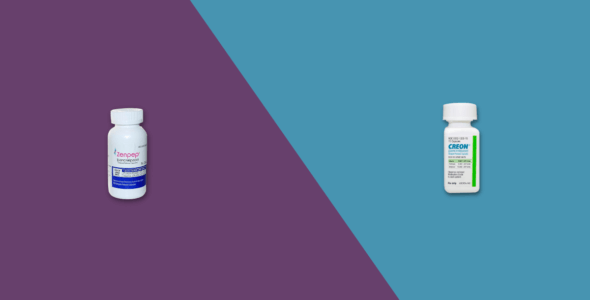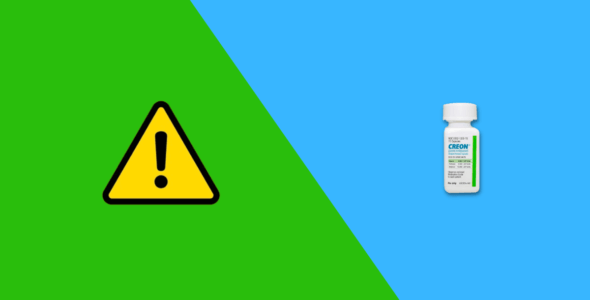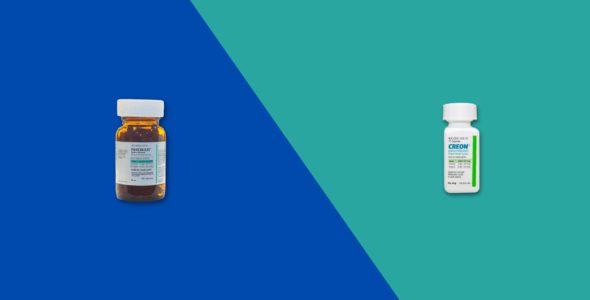Creon Dosage, forms & strengths
Complete a free online enrollment application to find out if you’re eligible to pay only $49 per month for your Creon medication.
Get started todayCreon is a type of pancreatic enzyme replacement therapy (PERT) manufactured by AbbVie Inc. It helps you break down fats, starches, and proteins in your food by replacing the natural digestive enzymes in your small intestine. It is FDA-approved to treat exocrine pancreatic insufficiency (EPI) due to cystic fibrosis, chronic pancreatitis, pancreatectomy, pancreatic cancer, or other medical conditions where your pancreas doesn’t make or release enough enzymes.
Creon dosage forms and strengths
Creon is available as a delayed-release capsule that contains enteric-coated microspheres with the following strengths:
- 3,000/U of lipase; 9,500/U of protease; and 15,000/U of amylase
- 6,000/U of lipase; 19,000/U of protease; and 30,000/U of amylase
- 12,000/U of lipase; 38,000/U of protease; and 60,000/U of amylase
- 24,000/U of lipase; 76,000/U of protease; and 120,000/U of amylase
- 36,000/U of lipase; 114,000/U of protease; and 180,000/U of amylase
Creon dosage for adults
Creon is a capsule taken by mouth and dosed by lipase units. The recommended starting dose of Creon is determined either by grams of fat ingested or by weight, according to the Cystic Fibrosis Foundation Consensus Conferences Guidelines.
Creon adult dosage chart
| Indication | Standard dosage | Starting dosage | Maximum dosage |
|---|---|---|---|
| Exocrine pancreatic insufficiency (EPI) | 500 units of lipase/kg of body weight per meal. | 500 units of lipase/kg of body weight to 2,500 lipase units/kg of body weight per meal. | 10,000 units of lipase/kg of body weight per day. |
Creon pediatric dosage chart
| Indication | Age | Starting dosage | Standard dosage | Maximum dosage |
|---|---|---|---|---|
| Exocrine pancreatic insufficiency (EPI) | Up to 12 months | 3,000 units of lipase per 120ml of formula or per breastfeeding. | 3,000 units of lipase per 120ml of formula or per breastfeeding. | 3,000 units of lipase per 120ml of formula or per breastfeeding. |
| Exocrine pancreatic insufficiency (EPI) | 12 months to < 4 years of age | 1,000 units of lipase/kg of body weight per meal. | 1,000 units of lipase/kg of body weight to 2,500 units of lipase/kg of body weight per meal. | 10,000 units of lipase/kg of body weight per day. |
| Exocrine pancreatic insufficiency (EPI) | 4 years of age and older | 500 units of lipase/kg of body weight per meal. | 500 units of lipase/kg of body weight to 2,500 units of lipase/kg of body weight per meal. | 10,000 units of lipase/kg of body weight per day. |
Creon dosage restrictions
- It appears that no dosage adjustments are needed with liver or kidney impairment.
How to take Creon
- Take Creon exactly as your healthcare provider tells you. Do not take more capsules in a day than the number your doctor describes for you (total daily dose). Your dose may be adjusted based on your body weight or the amount of fatty foods you eat.
- You should not switch Creon with other pancrelipase products without talking to your doctor.
- Take Creon with a meal or snack. If you eat a lot of meals or snacks, make sure you don’t exceed your total daily dose.
- Do not crush or chew the Creon capsule or its contents. Do not hold the capsule or its contents in your mouth. This can cause mouth irritation or change how Creon works in your body.
- For infants or patients who cannot swallow capsules whole, you can sprinkle the contents of the capsule on soft acidic foods (pH < 4.5) such as room temperature applesauce. The mixture should be swallowed immediately without chewing it. Follow with enough fluids to be sure there is no Creon left in the mouth.
- If you miss a dose of Creon, the next dose should be taken with your next meal or snack as directed. Do not double your dose or take extra Creon to make up for the missed dose.
- Read the Instructions for Use and Medication Guide that comes with your Creon prescription.
- Store Creon at room temperature between 59°F to 77°F (15°C to 25°C). You may store Creon between 77°F to 104°F (25°C to 40°C) for up to 30 days. Keep Creon in its original container in a dry place. Keep the bottle tightly closed between uses to protect it from moisture.
Creon dosage FAQs
What are some side effects of Creon?
Some common adverse reactions of Creon can include:
- Abdominal pain
- Headache
- Hyperglycemia (high blood sugar)
- Hypoglycemia (low blood sugar)
- Bloating
- Flatulence (gas)
- Vomiting
- Frequent bowel movements
- Constipation
- Dizziness
- Cough
- Sore throat
- Weight loss
Long-term high dose Creon can cause some serious side effects, including:
- Fibrosing colonopathy (scarring of your colon)
- Increase your uric acid levels (hyperuricemia)
- Viral infections
- Allergic reactions (hives, face swelling, throat tightness, difficulty breathing)
You can report any side effects you experience to the FDA at 1-800-FDA-1088 or www.fda.gov/medwatch.
What are some drug interactions with Creon?
While no drug interactions of Creon have been identified, you should make sure your healthcare professional knows all the medications you take, including prescription drugs, over-the-counter medications, vitamins, and herbal supplements.
Are there any contraindications or precautions with Creon?
You should not take Creon if you have a known hypersensitivity to Creon or any of its inactive ingredients.
What is the maximum dosage for Creon?
The maximum dose of Creon is less than or equal to 10,000 lipase units/kg of body weight per day.
Is it safe to use Creon while pregnant or breastfeeding?
There have been no identified risks of major birth defects, miscarriage, or other adverse maternal or fetal outcomes associated with Creon.
There is no data on whether Creon is found in human or animal breast milk, the effects on the breastfed infant, or the effects on milk production. Since Creon is minimally absorbed into your bloodstream, it is not expected to have any adverse effects if used during lactation. Contact your healthcare provider for medical advice if you are pregnant, plan on becoming pregnant, or are breastfeeding.
Do I have to keep track of what I’m eating while taking Creon?
Your Creon dose is typically based on certain factors, including how much fat you eat. Keeping track of your meals, snacks, and any adverse effects you may be having can help your doctor determine if you are on the right Creon dose.



